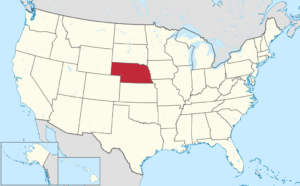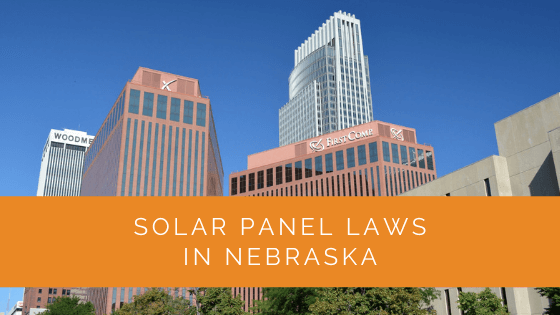 Nebraska is part of America’s breadbasket. The state receives enough sunshine to keep crops growing healthy. The state is sunny throughout the year, with up to 200 sunny days.
Nebraska is part of America’s breadbasket. The state receives enough sunshine to keep crops growing healthy. The state is sunny throughout the year, with up to 200 sunny days.
The state receives about five to six hours of sunlight daily, making it a great area to harvest solar energy.
A lot of sunlight is a natural incentive to make homeowners invest in solar systems in Nebraska. The Nebraska state government has not formulated policies concerning solar energy and harvesting.
There’s a lot of untapped potential in the state. Nebraska ranks 47th in the country for installed solar capacity with about 29 MW, according to the Solar Energy Industries Association (SEIA).
Compared to the amount of sunlight the state receives, solar energy is currently underutilized in Nebraska. 14% of power is derived from renewable sources. Even though the state has excellent solar potential, wind power is more popular and widely used.
The state is also in the top ten counties with the highest electricity consumption per capita. This is mainly due to the robust food processing and agriculture industry.
Contents
Key Takeaways
- Nebraska has ample sunlight, making it a favorable location for solar energy, but the state currently underutilizes solar power despite its potential.
- The lack of government incentives and policies for solar energy has contributed to Nebraska’s limited adoption of renewable energy sources.
- Residents can benefit from net metering, federal solar investment tax credits, and solar loans to make solar power more financially viable in the state.
Introduction
The state’s lack of a Renewable Energy Portfolio Standard gives the utility providers little incentive to pursue renewable energy options to generate electricity.
The state is not considered solar-friendly due to the government’s reluctance to offer incentives that will generate interest in renewable energy sources.
However, solar panels have started popping up around the state. Property owners are taking advantage of the year-round sunny days to save on electricity costs while saving the planet.
The ideal solar system array mainly depends on your home’s consumption and the rooftop size. Many residential PV systems average around 5 kW. A 5 kW solar system in Nebraska can set you back $20,000.
The benefits of going solar are that you start enjoying savings from the day of solar installation in Nebraska as it instantly starts to produce power. Customers connected to the grid pay an average of $0.12 per kWh. This is lower than the national average.
Using the average cost of electricity in Nebraska, you can save up to $750 in electricity costs the first year alone. You can expect the solar system to pay itself back in 15 years.
Most solar panels come with a 25-year warranty. You don’t have to worry about incurring any maintenance costs. You start receiving savings from the onset of your installation for many years.
Nebraska doesn’t have a robust legal environment that spurs interest in solar energy and renewable sources. Here are the various solar panel laws in Nebraska.

Net Metering In Nebraska
Despite little to no effort on solar power legislation, Nebraska has a robust net metering system. The net metering system is provided to residents with solar power systems installed on their properties.
Net metering allows you to connect to the grid even when installing a solar system. When the solar panels produce more energy than your household needs, the extra energy is sent to the grid for use elsewhere.
Every watt adapted to the grid from your household solar power system earns you solar credits. These credits can offset your electricity bill when your solar power is not producing enough energy to support your household’s needs.
This happens mainly during the winter season when hardly any sun shines. Net metering allows you to use the grid as a big battery for your household.
Net metering in Nebraska is not the ordinary net metering in other states. All monthly surplus energy production (net excess generation or NEG) is applied as a credit to your next bill at whatever the utility provider decides is fair.
This type of system is ambiguous, and it’s hard to calculate how much savings one generates by going solar.
It is wise to size your solar system accordingly to suit your household’s needs and maximize the benefits provided by net metering.
Federal Solar Investment Tax Credit
The Federal Solar Investment Tax Credit is called the Investment Tax Credit (ITC). It allows you to deduct 30% of your solar system’s total cost from taxes you owe the government.
The total cost of the solar system includes the solar panels, installation costs, and the auxiliary components. This incentive will have the most significant impact on reducing the costs of solar systems.
If your solar system sets you back $20,000, you are eligible for a tax credit of $5,200.
This incentive is available to anyone buying a solar system, whether by cash or through a loan. You don’t need to pay any upfront cash to qualify for this incentive.

Solar Loans in Nebraska
Homeowners who don’t have spare cash to buy a whole solar system at once can take a loan to buy a solar system and use the money saved through the tax incentive to pay the first installments.
The tax cut can be deducted directly from the total taxes due. If you don’t pay enough taxes to pay off the tax credit in the first year, you can split the tax credit over the subsequent years.
Going solar in Nebraska will generate more savings on electricity costs, which can be used to pay back the solar PV system’s loan.
Solar panels and PV systems are not exempted from sales and property taxes.
Case Study: Residential Solar Installation in Nebraska
Background
In the heart of Nebraska, the city of Kearney enjoys abundant sunshine, making it an ideal location for solar energy projects. Despite the state’s limited solar policies, the potential for solar energy generation remains high due to its favorable climate.
Project Overview
We at Solar Panels Network USA were approached by a homeowner in Kearney interested in reducing their energy bills and carbon footprint. The project aimed to install a 5 kW residential solar system tailored to the household’s energy consumption and rooftop size.
Implementation
Initial Assessment: We began with a comprehensive energy audit to understand the household’s energy needs. This involved analyzing historical data of their electricity usage to accurately size the solar system.
Design and Planning: Using our expertise, we designed a system that optimally utilized the available rooftop space. The design phase ensured all components worked harmoniously.
Installation: The installation process involved a series of carefully planned steps. The solar panels were installed with precision, ensuring they were positioned to maximize sunlight exposure throughout the year.
Connection and Testing: Post-installation, we connected the system to the grid, ensuring it complied with Nebraska’s net metering regulations. This involved configuring the system to handle energy production and consumption effectively.
Results
The installed solar system began generating power immediately, significantly reducing the homeowner’s reliance on grid electricity. The system’s performance was continuously monitored, showing a substantial drop in monthly electricity bills.
The project’s success was evident in the first year, with the homeowner saving approximately $750 on electricity costs. Additionally, the Federal Solar Investment Tax Credit helped offset the initial installation cost, further enhancing the system’s financial viability.
Summary
This project in Kearney, Nebraska, highlights the untapped potential of solar energy in the state. Despite the lack of state-level incentives, the combination of abundant sunshine, federal tax credits, and net metering benefits makes solar a compelling option for residents. At Solar Panels Network USA, we continue to deliver high-quality, customized solar solutions that empower homeowners to harness the sun’s power, contributing to a more sustainable future.
Expert Insights From Our Solar Panel Installers About Solar Panel Laws in Nebraska
Nebraska’s ample sunshine provides an excellent opportunity for solar energy utilization, despite the lack of state policies to support it. Homeowners are beginning to see the benefits of investing in solar systems to cut down on their electricity bills and contribute to environmental sustainability.
Lead Solar Installer
One of the challenges we face in Nebraska is the ambiguous net metering system. While it allows homeowners to earn credits for excess energy, the lack of a clear pricing structure can make it difficult to calculate exact savings. It’s crucial to size your system correctly to maximize these benefits.
Senior Solar Technician
The Federal Solar Investment Tax Credit is a significant incentive for homeowners looking to go solar. By reducing the upfront costs by 30%, it makes solar systems more accessible and financially viable, encouraging more residents to adopt renewable energy solutions.
Solar Energy Consultant
Experience Solar Excellence with Us!
Trust in Solar Panels Network USA, where our seasoned experts deliver top-quality solar solutions for homes and businesses nationwide. With a legacy of countless successful installations and a commitment to sustainable energy, we’re your reliable partner in the solar journey. Ready for a brighter, eco-friendly future? Call us now at (855) 427-0058 and harness the power of the sun!
Map image by Wikimedia Commons User: TUBS / CC-BY-SA-3.0
About the Author
Solar Panels Network USA stands at the forefront of solar energy solutions, driven by a team of seasoned solar engineers and energy consultants. With over decades of experience in delivering high-quality solar installations and maintenance, we are committed to promoting sustainable energy through customer-centric, tailored solutions. Our articles reflect this commitment, crafted collaboratively by experts to provide accurate, up-to-date insights into solar technology, ensuring our readers are well-informed and empowered in their solar energy decisions.

